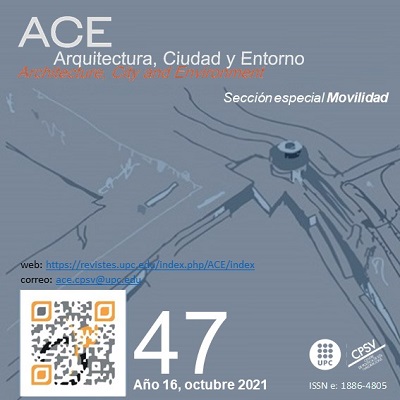La Planificación de Áreas Logísticas como estrategia para una reutilización del territorio
DOI:
https://doi.org/10.5821/ace.16.47.9042Palabras clave:
Planificación urbana, reutilización, áreas logísticas, transformación urbanaResumen
El territorio es un recurso finito, soporte de la vida y generador de los ciclos del agua y la energía en el planeta. La primera consecuencia del crecimiento de la población urbana y de la expansión del entorno construido es el consumo de suelo. En la actualidad, hay estrategias para reducir este gasto, por ejemplo, moderando el crecimiento disperso, favoreciendo los modelos de ciudad compacta y reutilizando el parque construido. Un porcentaje considerable del suelo urbano actual se destina a usos logísticos y esta proporción va en aumento como consecuencia de las economías deslocalizadas. Sin embargo, las estrategias de planificación urbana parecen pasar por alto estas áreas logísticas. La localización de estas zonas, bien conectadas y situadas en el área de influencia de una ciudad, les confiere una alta probabilidad de ser absorbidas por el tejido urbano de uso mixto durante el proceso de crecimiento de ésta. Por esa razón, la planificación del suelo logístico urbano, teniendo en cuenta su posible conversión futura en un tejido urbano de uso mixto, se convierte en un reto urgente. El estudio analiza algunas zonas industriales que se han transformado en tejido urbano de uso mixto para establecer una correlación entre ellas y las zonas logísticas actuales. En el caso de las áreas logísticas hay que prestar especial atención a las infraestructuras de transporte, la legislación, el uso del suelo, la preservación del ecosistema, así como la introducción progresiva de usos mixtos. El objetivo es concienciar a los profesionales de la planificación sobre la importancia de la planificación del suelo logístico teniendo en cuenta su posible reutilización futura en un tejido urbano de uso mixto y su transformación con bajos costes energéticos y medio ambientales.
Descargas
Publicado
Número
Sección
Licencia
COPYRIGHT
El contenido de los artículos y los comentarios en ellos expresados son responsabilidad exclusiva de sus autores, y no reflejan necesariamente la opinión del comité editor de la revista. Los trabajos publicados por ACE pueden reproducirse bajo la licencia CC-BY-NC-ND 3.0 ES más información http://creativecommons.org/licenses/by-nc-nd/3.0/es/
Lo que implica que las personas autoras sólo retienen y mantienen los derechos de Copyright dentro de las limitaciones incluidas en la licencia anterior.


































